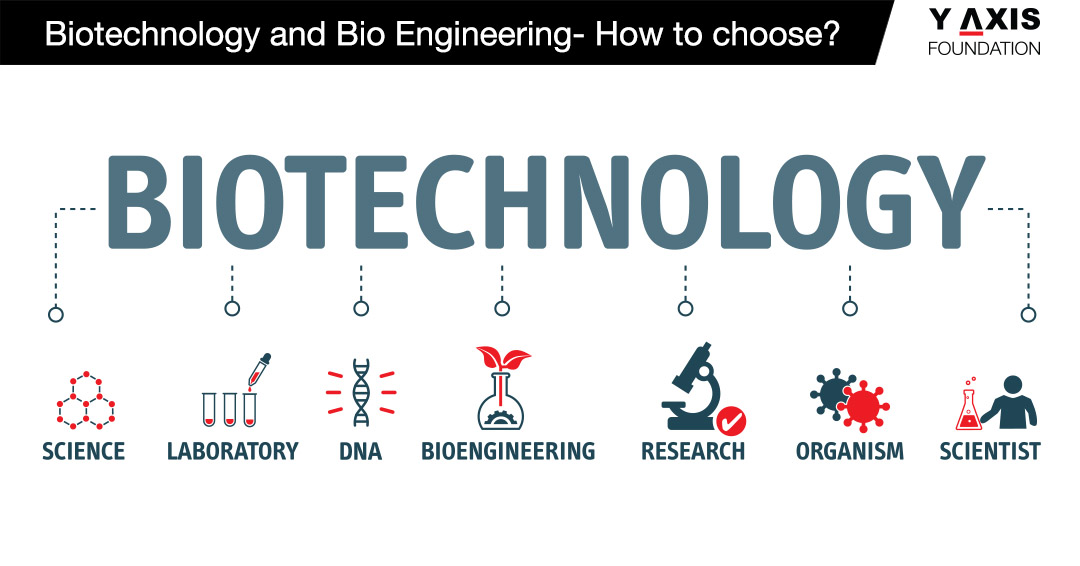
Biotechnology deals with life science and develops useful products for the agricultural, food and medical industries. Biotechnology covers the study of microorganisms such as bacteria, in industrial, agricultural, medical and other technological applications but not only the medical aspects.
Bioengineering focuses on the application of engineering on biological processes, food, agriculture and environmental processes. Bioengineering is the use of the principles of engineering as well as its techniques to problems that arise in biology and medicine.
Scope of Biotechnology
Biotechnology is one of the emerging career fields. Food Technology, Nutrition, Medicines, Healthcare, Forensic Sciences are some of the fields of Biotechnology. The scope of Biotechnology is wide and offers opportunities in the field of both research and engineering. Biotechnology is an interdisciplinary subject that covers topics such as biochemistry, cell biology, genetics, molecular biology, embryology, chemical engineering and robotics. It also involves laboratory work, along with analysing biological research. Biotechnology, uses biology as living processes, organisms or systems to manufacture products and technology intends to improve the quality of human life.
Scope of Bioengineering
Bioengineering, is the application of engineering principles to the fields of biology and health care. Bioengineers work with doctors, therapists and researchers to develop systems, equipment and devices in order to solve clinical problems. They deal with systems to monitor vital signs and blood picture. Bioengineering research includes bacteria engineered to produce chemicals, new medical imaging technology, portable and rapid disease diagnostic devices, prosthetics, biopharmaceuticals, and tissue-engineered organs.
Curriculum of Biotechnology MS
A Master of Science or MSc is a graduate degree with a focus in science, medicine, or engineering. The MSc in Biotechnology combines two of these disciplines, focusing on biology and chemistry along with principles of design and engineering. Students pursuing this degree learn about a wide range of topics.
Curriculum of Bio Engineering MS
Bioengineering focuses on engineering and biological sciences. Programs include laboratory- and classroom-based courses, in subjects such as fluid and solid mechanics, computer programming, circuit design, and biomaterials.
Requirements for studying MS Biotechnology, Bio engineering in the USA
- Undergrad with Major in Biology, Chemistry, Biotechnology, Computational Chemistry, Computational Biology from reputed Institution with minimum 3.5 GPA (to get into competitive university)
- GRE and Subject GRE (Biology/ Chemistry) https://www.ets.org/gre/subject/about
- IELTS and TOEFL
- SOP and LORS justifying your knowledge base towards the subject, Interest and aims
- Inclination towards learning new technology and research
Job Opportunities – Biotechnology Careers
- Biomedical Engineer
- Biochemist
- Medical Scientist
- Biological/Clinical Technician
- Microbiologist.
- Process Development Scientist
- Biomanufacturing Specialists
Job Opportunities – Bio engineering Careers
- Biomaterials Developer
- Manufacturing Engineer
- Independent Consultant
- Research on Artificial organs
- Developing Surgical Robots
- Advanced prosthetics
- Rehabilitation Engineering
- Medical Technology Developer
- Medical Imaging
Top Universities in USA for Bio Technology
- Johns Hopkins University
- University of Pennsylvania
- University of Wisconsin
- Purdue University
- University of Georgia
- Boston University
- University of Rhode Island
- North western University
- Columbia University
- University of Michigan Ann Arbour
Top Universities in USA for Bio Engineering
- Emory University-Georgia Institute of Technology
- Massachusetts Institute of Technology
- Duke University (Pratt)
- Stanford University
- University of California Berkeley
- University of California San Diego (Jacobs)
- University of Pennsylvania
- Boston University

Biotechnology and Bio Engineering – How to choose?
Posted on May 11, 2020